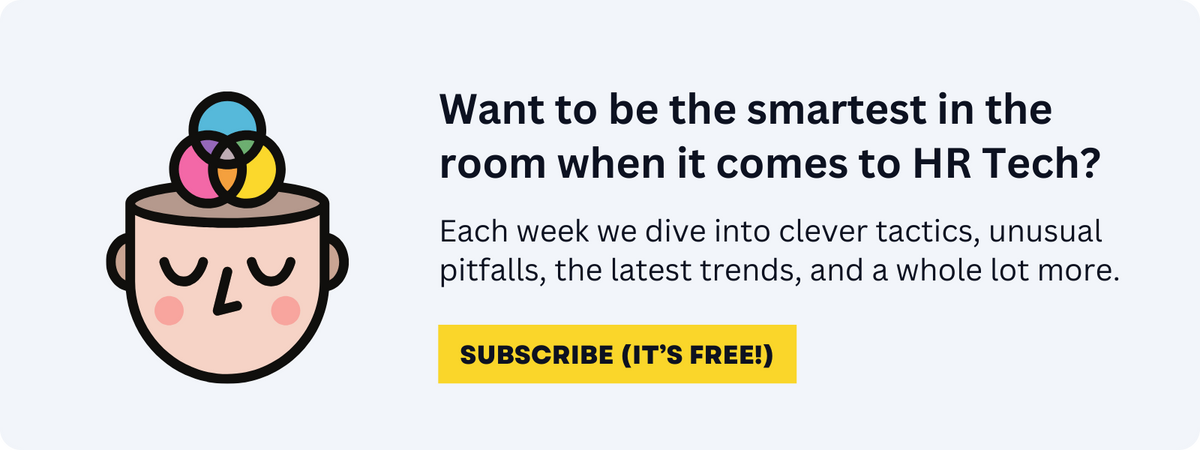Human resources skills, also known as HR skills, encompass a range of essential abilities necessary to manage an organization's workforce effectively. These skills enable HR teams to onboard the right hires, provide talent development, manage employee benefits, and stay informed about employment laws.
Essentially, possessing strong HR skills is crucial to cultivating a positive and productive workplace. It’s no surprise that the field is on the rise, with HR careers expected to grow by about 10% by 2030, according to the United States Bureau of Labor Statistics.
Whether you're an early career recruiter or a seasoned HR specialist aiming to step into a leadership role, this article will guide you through the soft skills, technical competencies, and key HR abilities that employers want to see on your HR resume, LinkedIn profile, and job interview.
Plus, we'll highlight some pro tips that can give you an edge in the competitive world of human resources.

#1. Communication Skills
Strong communication skills are undoubtedly a top HR generalist priority. Throughout a career in human resources, you will engage and converse with tons of people. You will conduct interviews, deliver presentations, and participate in conflict resolution, all of which require that you’re able to communicate and listen like a pro.
Therefore, not only should you ensure your HR resume is ATS-friendly, but you should also emphasize your top-notch communication skills to attract prospective employers.
- Clear Written Communication: In most HR roles, you will be expected to write memos and employee handbooks that provide clear directives.
- Conflict Management: An important component of HR and employee relations is leading difficult conversations and resolving employee conflicts fairly.
- Active Listening: Active and critical listening skills will help you engage well with team members and achieve fast and effective resolutions.
- Interpersonal skills: As an important contact point representing the organization, employees (and especially new hires) need to feel safe and welcome in your company. This is achieved by being both professional and approachable when dealing with people.

#2. Organizational Skills
As a human resource specialist, your job is to be a bridge between employees, executives, and department heads. Meeting every level’s hiring goals, priorities, and compliance requirements is a juggling act that can quickly become overwhelming if you’re not organized.
Here are the essential organizational management skills you should have in your HR resume:
- Excellent Time Management: HR professionals deal with many critical and time-sensitive tasks. These include payroll budgeting, hiring, and performance reviews.
- Proven Knowledge of Record Keeping: The HR team at an organization keeps a record of all personal details of all employees. You will be expected to retrieve and manage employee data with the utmost care. Mismanagement of confidential or sensitive information can result in legal trouble for the company.
- Multitasking Abilities: An HR pro's duties are many and varied. You will have to conduct interviews, manage employee cross-training, oversee HR policies, handle complaints, and so forth. This means you have to be a fully hands-on person who can handle multiple priorities and an unexpected curveball from time to time.
#3. Discretion
The ability to keep a straight face is one of the underrated skills needed for HR.
As an HR professional, you will often sit in on discussions about your co-workers concerning sensitive matters. Being privy to employee data and information on incentive compensation, medical issues, mental health, conflict, performance, workplace injury, harassment, and disciplinary problems puts a big responsibility on you in terms of maintaining employees’ privacy. Employees and employers must be able to trust you with this sensitive information.
Additionally, the HR department will be informed in advance if a company plans to undergo significant staffing changes. Firm ethics regarding confidentiality is a critical point to add to your resume, preferably with a reference letter from a previous HR job to back it up.
#4. High Emotional Intelligence
As an HR professional, your interpersonal skills and understanding of people will greatly affect your success. What drives a person, triggers them, scares them, demotivates them, and engages them is often hidden behind their words and actions. These insights come with high emotional intelligence and empathy.
#5. Decision-Making Skills
Working in human resource management, you will have to make many decisions that have a significant impact on the company, for instance, during recruitment. It’s thus important to lean on data-driven recruitment instead of letting hiring bias influence your choices.
Effective decision-making skills are rooted in strategic thinking, analysis, intuition on valuable initiatives, and experience. Be sure to highlight data-driven decisiveness as one of your top human resources skills in a job interview.
#6. Adaptability
As an HR leader, you want to show that you can modify old company policies, create new ones (e.g., AI policy, hybrid work policy), and help employees embrace change. This is only possible if you are not averse to processing evolution yourself.
As part of your people management skills, you want to show that you do not settle into a comfort zone. As an HR professional, you must keep refining policies that ensure an engaging and psychologically safe work environment for all employees.
Consequently, a form of adaptability that you’ll want to highlight is the willingness to learn new, important HR skills during your tenure, depending on the organization’s strategic development needs.
#7. Objectivity and Critical Thinking
In hiring, conflict resolution, disciplinary action, and many other matters of HR, your ability to remain objective is essential. As a representative of the company, an HR professional cannot be biased, unfair, or discriminatory in any way.
When discussing past work experience, demonstrate that you take action based on clear evidence instead of assumptions and claims.
#8. A Strong Command of HR Technology
HR tech is one of the fastest-growing software landscapes. You do not want to be left behind in your ability to navigate and leverage these tools and their trends.
Larger companies will typically have a Human Resource Information System (HRIS) and an Applicant Tracking System (ATS). They may have additional recruitment tools, onboarding tools, and performance management systems, depending on the level and frequency of hiring.
Although you may not have experience in using all these tools, familiarity with a few of the best HRIS and best ATS solutions on the market will be beneficial to list on your resume.

#9. Financial Understanding
A good grasp of financial management is essential for two reasons:
1. Remuneration
All employee compensation goes through the human resources department. You’ll need adequate financial insight to determine market-appropriate salaries for various positions. You may also need to manage tax and 401K contributions relevant to the hire’s compliance requirements.
2. Budgeting
Training, outsourced recruiting, talent development, incentives, and company social activities need to come from HR and recruiting budgets. Be clear about how your financial skills have helped companies optimize spending. Specifically, point out any implementations you made that positively affected cost per hire and time to fill. These are HR metrics that have a direct effect on the company’s bottom line.
Pro-tip: For a thorough understanding of how new implementations in the HR department relate to Dollar value, we recommend signing up for our free online course on Calculating and Proving the ROI of using HR Tech.
#10. Training and Development
As an HR specialist, you are the custodian of your organization’s collective skills. Show prospective employers how you intend to hone their company’s abilities by organizing and promoting your HR development and internal mobility program.
If you’ve overseen the growth of junior employees to supervisor or management level, definitely showcase this in your resume and interview.
#11. Talent Onboarding Skills
Employee onboarding refers to introducing newly hired professionals to the company. The onboarding experience you offer is critical to employee churn. According to recent employee retention statistics, 20% of new staff leave their role in the first 45 days due to a lack of proper onboarding.
If your onboarding knowledge can lower turnover rates, it will be a significant asset to the company.
#12. Administrative Skills
As an HR professional, you’ll be expected to manage payrolls, leave calendars, attendance records, job applications, and other administrative duties to a high level of efficiency.
The administrative skills you need consist of traditional record-keeping and proficiency with the company’s HRIS software.
#13. Strategic Thinking
Strategic HR management plays a crucial role in shaping the company’s long-term goals and achieving them.
Show your understanding of how the company makes money and retains valuable talent, and how your insight will lead to improvement in these areas.
To learn how HR can operate as a strategic function, we recommend reading our Guide on Strategic HRM.
#14. Leadership Skills
Leadership skills are important, even if you are not yet an HR manager.
You use the same leadership mindset to show that you can improve the organizational culture and mentor junior employees to become the leaders of tomorrow. In your interview, demonstrate that you know how to coach employees and cultivate high-value expertise from within a company’s existing talent pool.
#15. Data Analytics
Being analytically minded is one of the most critical abilities for an HR specialist to possess, especially if you focus on people operations.
How well you analyze and interpret workforce data will determine how you manage your hiring budget and staffing needs.
Human resources use data analysis to:
- Measure employee engagement
- Continuously monitor organizational performance
- Predict hiring needs and patterns
- Measure and act on employee retention levels
- Document hiring trends and HR trends
Your HR tech stack will play a large part in how much data you have to work with. However, how you analyze, interpret, and act on the data at hand is what will determine valuable results.
Show prospective employers your knowledge of using people analysis software in your HR career and examples of how your interpretation of this data led to measured improvements.
Pro-tip: Use our PeopleOps Job Board to find your next career opportunity.

#16. Event Management and Promotion
In life, event management is a career in its own right. In the corporate world, this responsibility often falls on HR professionals. In your resume, show previous experience in planning company retreats, welcome and farewell events, year-end parties, staff appreciation days, workshops, and the like.
Show how you communicated the objectives of the event, created a buzz amongst employees, budgeted, and achieved value from your efforts.
#17. Team Building Skills
Besides arranging a team-building activity outside the office, you can boost workplace morale with meaningful employee appreciation day gift ideas.
Arranging and facilitating events like trivia quizzes, trust-building workshops, and company sports games are stand-out experiences to put on your CV. Point out how your ability to arrange these in-house events improved cohesion, and what this required in terms of budget.
#18. Research and Continued Learning
HR is an ever-evolving field. HR professionals who aspire to leadership roles continually research new HR technology trends, practices, and techniques to maintain their skills.
In an interview, talk about the latest trends and findings in HR, as well as expert resources you follow to show that you care about new developments in your chosen field.
Extra Resources for Improving Your HR Skills and Careers
- SSR Newsletter: Want to be the smartest in the room when it comes to HR Tech? From discussions about the latest in HR Tech to exclusive insights into the world of People Ops, our weekly newsletter covers it all. See our past newsletters here and subscribe to our newsletter here.
- Calculating and proving the ROI of using HR Tech: This free SSR course will help you learn how to assess and present the return on investment for new HR technology tools, ensuring that you launch the right initiatives with the necessary executive support.
- PeopleOps Conversion Rates 101: This free one-hour course covers specific conversion rates within the recruiting funnel, how they impact operations, as well as how they relate to HR metrics and ROI.
- 12 Job Search Strategies to Find Your Next Role in HR, TA, or Recruitment: Tried and tested job search strategies from PHR and SHRM-CP Jodie Sandell to find your new HR position.
- How to Land an HR Job With No Experience: While some prior experience or knowledge is always helpful, many necessary skills are quickly learned through on-the-job training and mentorship. This article provides tips from PeopleOps and business leaders on starting an HR career from square one.
- How to Write an HR Cover Letter that Stands Out from the Candidate Pile: Understanding how to write a great HR cover letter allows you to frame your skills positively to grab the hiring manager's attention. This article explains how to make your human resources cover letter stand out from the crowd.
- 25 Best HR Certifications to Acquire (Online, Free, & Paid): For professionals who have spent a few years in the field and want to advance in their careers, HR certifications are vital stepping stones toward promotions and new job opportunities. Our expert has compiled a list of certifications along with key factors to help you determine which ones are best suited for you.
- Career Path Advice for HR Pros Looking to Level Up: If you're looking to advance your career and aspire to become a Chief Human Resources Officer (CHRO) or Chief People Officer, check out this helpful video. It outlines the best career path to take and prepares you for your next big step.
Knowing Your Worth
Possessing the skills covered in this article will help you excel as an HR professional, but your skill set will also be a catalyst for propelling your company to the next level.
In your quest to become a leader in HR, always remember and respect the critical part you play in the organization that is lucky enough to employ you.
























